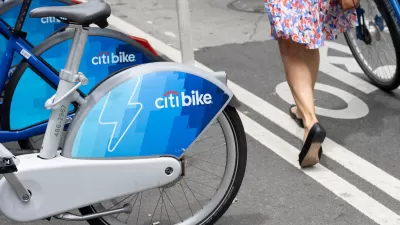New York City's bike share program, Citi Bike, enjoys a greater percentage of female cyclists that the city as a whole, but still only reaches 25 percent. The problem is typical of bike share programs in the United States.
"Women are early indicators of a successful bike system," Sarah M. Kaufman, the assistant director for technology programming at the Rudin Center for Transportation at New York University and an author of a new report on Citi Bike, told Emma G. Fitzsimmons of The New York Times. "If you have more women riders, that means it’s convenient and safe."
But two years in, Citi Bike’s inroads have been decidedly uneven, with men far outnumbering women in using the bike-sharing system.
"For the bike service, that is a problem...but persuading more women to join is seen as vital to the success of Citi Bike," writes Fitzsimmons. "Today, women take about a quarter of all trips by Citi Bike riders and make up just under a third of its members."
Of course, since there's a gender gap in biking itself, it follows that bike share programs would experience the same problem. "Citi Bike’s gender gap is part of a broader pattern among cyclists across the country; bike-share systems in Chicago and Washington also have more male riders," writes Fitzsimmons.
Will less busy streets result in increased female ridership?
"Women have avoided riding in bustling Midtown Manhattan and often stick to less chaotic neighborhoods on the Lower East Side and in Brooklyn, the NYU report said." It went on to suggest that "Citi Bike’s planned expansion this year to Long Island City in Queens and further into Brooklyn in Bedford-Stuyvesant and Greenpoint could help diversify its customer base, bringing in less wealthy riders and more women."
The piece generated lots of comments from readers, so much so that The Times devoted an article to it. My favorite: "I believe that the biggest factor discouraging most people, not just women, from biking in the city is the lack of an adequate infrastructure for bikes, the absence of which can make biking a truly scary proposition for the average New Yorker," commented Wing from Queens.
Correspondent's note: Some of the challenges to reducing the gender gap, not just in the U.S. but internationally, have been discussed here before—in particular in the bottom three "related" posts listed below.
FULL STORY: A Mission for Citi Bike: Recruiting More Female Cyclists

Planetizen Federal Action Tracker
A weekly monitor of how Trump’s orders and actions are impacting planners and planning in America.

Maui's Vacation Rental Debate Turns Ugly
Verbal attacks, misinformation campaigns and fistfights plague a high-stakes debate to convert thousands of vacation rentals into long-term housing.

Restaurant Patios Were a Pandemic Win — Why Were They so Hard to Keep?
Social distancing requirements and changes in travel patterns prompted cities to pilot new uses for street and sidewalk space. Then it got complicated.

In California Battle of Housing vs. Environment, Housing Just Won
A new state law significantly limits the power of CEQA, an environmental review law that served as a powerful tool for blocking new development.

Boulder Eliminates Parking Minimums Citywide
Officials estimate the cost of building a single underground parking space at up to $100,000.

Orange County, Florida Adopts Largest US “Sprawl Repair” Code
The ‘Orange Code’ seeks to rectify decades of sprawl-inducing, car-oriented development.
Urban Design for Planners 1: Software Tools
This six-course series explores essential urban design concepts using open source software and equips planners with the tools they need to participate fully in the urban design process.
Planning for Universal Design
Learn the tools for implementing Universal Design in planning regulations.
Heyer Gruel & Associates PA
JM Goldson LLC
Custer County Colorado
City of Camden Redevelopment Agency
City of Astoria
Transportation Research & Education Center (TREC) at Portland State University
Jefferson Parish Government
Camden Redevelopment Agency
City of Claremont




























